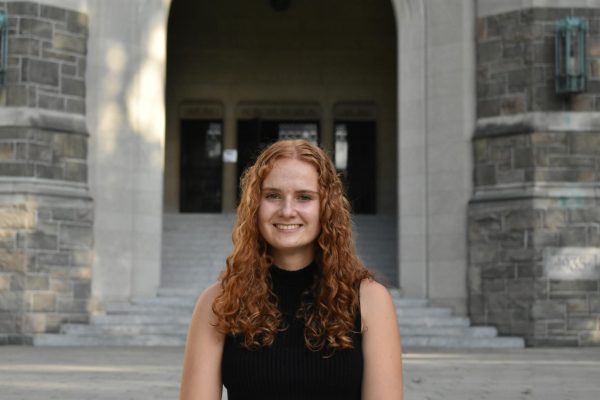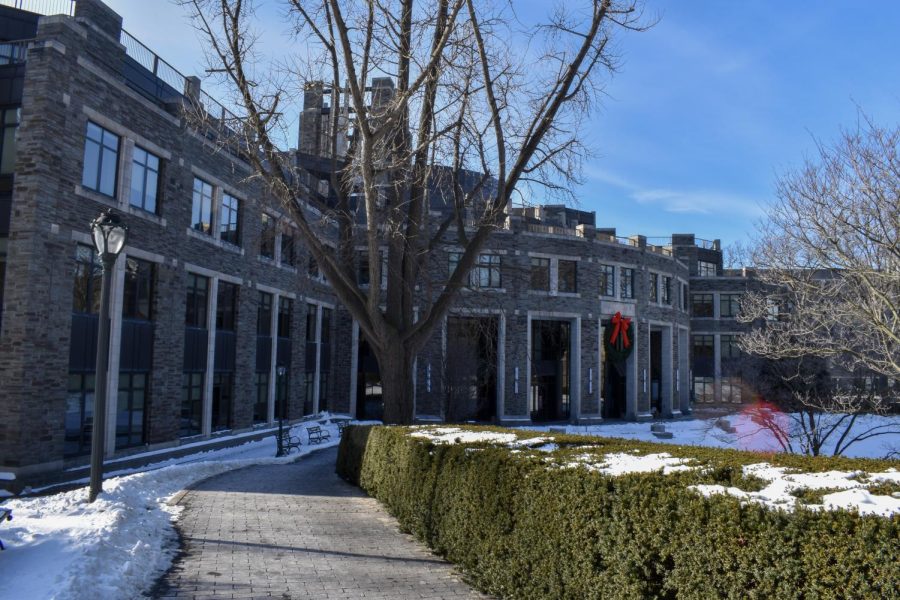Fordham Libraries Receive New COVID-19 Archive Grant
Fordham recently received a grant to help expand and build it’s COVID-19 archive.
The Fordham University Libraries Digital Collections team received a grant from the Institute of Museum and Library Services (IMLS) that will allow for the expansion of the university’s COVID-19 archives. The Libraries Digital Collection team has been compiling an archive of documents detailing the university’s response to the pandemic since April 2020. The team has included content ranging from the university’s weekly “5 Things” COVID-19 update emails to photos of campus testing sites to the documentation of signage telling people how to social distance. The new grant gives money to help this project continue.
“I first learned of the grant in May of 2021, and the application was submitted on June 28. We were notified that we had been awarded the grant on Oct. 26, 2021. Our IMLS grant proposal project is entitled In Real Time: The Fordham University COVID-19 Archive,” said Linda LoSchiavo, director of libraries. “We were awarded $30,299 to purchase equipment (additional scanners, video equipment) to enhance and enlarge the Archive.”
According to Mariah Lewis, the metadata management librarian at Walsh Library, the library began compiling information on the university’s COVID-19 response before there was an actual virtual space for it on the library’s digital collections page.
“When we begin brainstorming for a new digital collection, we pull from either interesting themes from items in our physical collections or larger university-wide initiatives or events that may have related materials that would be important to showcase. The COVID-19 Digital Archive was a kind of unique situation — it was not something we could have ever foreseen or planned for, but it was something we immediately knew should be documented,” said Lewis.
Lewis explained that they began to compile the university’s COVID-19 response by observing how individual university departments acted during the coronavirus outbreak. The team then began to collect correspondence received from the administration. Additionally, the team started saving and looking for pieces of media that helps demonstrate what life was like for the Fordham community.
“Fordham community organizations like The Observer and the Ram very quickly became places we looked for pandemic-related content. Certain faculty members were on top of creating new projects in response to the pandemic and our collecting only grew from there,” said Lewis. “It was so early in the pandemic that doing more outreach for things like interviews was not necessarily a priority — people were still trying to figure out how to proceed in the pandemic landscape. While we worked with some of the student community in the early days, we really wanted them to focus on both the sudden transition and the shock of the pandemic.”
The archive focuses on the Twice Over Podcast, created by Steve D’Agustino, Fordham’s director of online learning, and Anne Fernald, Fordham’s special advisor to the provost for faculty development and co-chair of the university council on diversity, equity and inclusion. The podcast, which was created at the initial switch to online learning, is aimed at helping faculty make that transition when it comes to teaching.
The archive also focuses on the Bronx COVID-19 Oral History project. This initiative, led by a team of Fordham students and faculty, is dedicated to capturing the essence of the Bronx and how the community was affected by COVID-19. The site includes interviews, artists’ profiles and business highlights. It aims to show how the Bronx, a borough highly affected by COVID-19, dealt with all the challenges the pandemic brought.
After the initial outbreak of the pandemic, the project’s attention shifted from focusing on the immediate response to how people were being continuously affected.
“Once the Fordham community seemed to have settled into the new pandemic routine, the outreach requesting permission to include the content and requesting interviews and additional content began. We have kept going since then, working to expand our connections with the Fordham community to find additional related records or experiences,” said Lewis.
This year, the Libraries Digital Collection team wants to continue to focus on interviewing the Fordham community about their experiences dealing with the pandemic. While they will continue to scan documents and what they have been doing, there will be an emphasis placed on video interviews. The grant will allow them to purchase equipment to record the interviews.
“We applied for funding for additional scanners, as well as video recording equipment. Our goal this year is to get as many video interviews as possible into the archive, thereby allowing the entire Fordham community to tell us what their experiences were with COVID-19 in terms of Fordham and their lives. We will also continue scanning any and all hard copy COVID-19 documents and photographs that we have amassed since 2020,” said LoSchiavo.
Creating an archive to document COVID-19 practices is important. According to LoSchiavo, having a comprehensive understanding of the way that Fordham University handled the pandemic is especially important. “I really thought this was a way to show future historians how lives changed under the duress of a pandemic. If enough schools do this, it’ll be a way to compare and contrast how public institutions handled it, how private institutions handled it, and how as a large Catholic, Jesuit university in the middle of New York City, the epicenter of the pandemic, it affected our students’ lives,” LoSchiavo told Fordham Library News.

Isabel Danzis is a senior from Bethesda, Md. She is double majoring in journalism and digital technologies and emerging media. The Ram has been a very...







































































































































































































